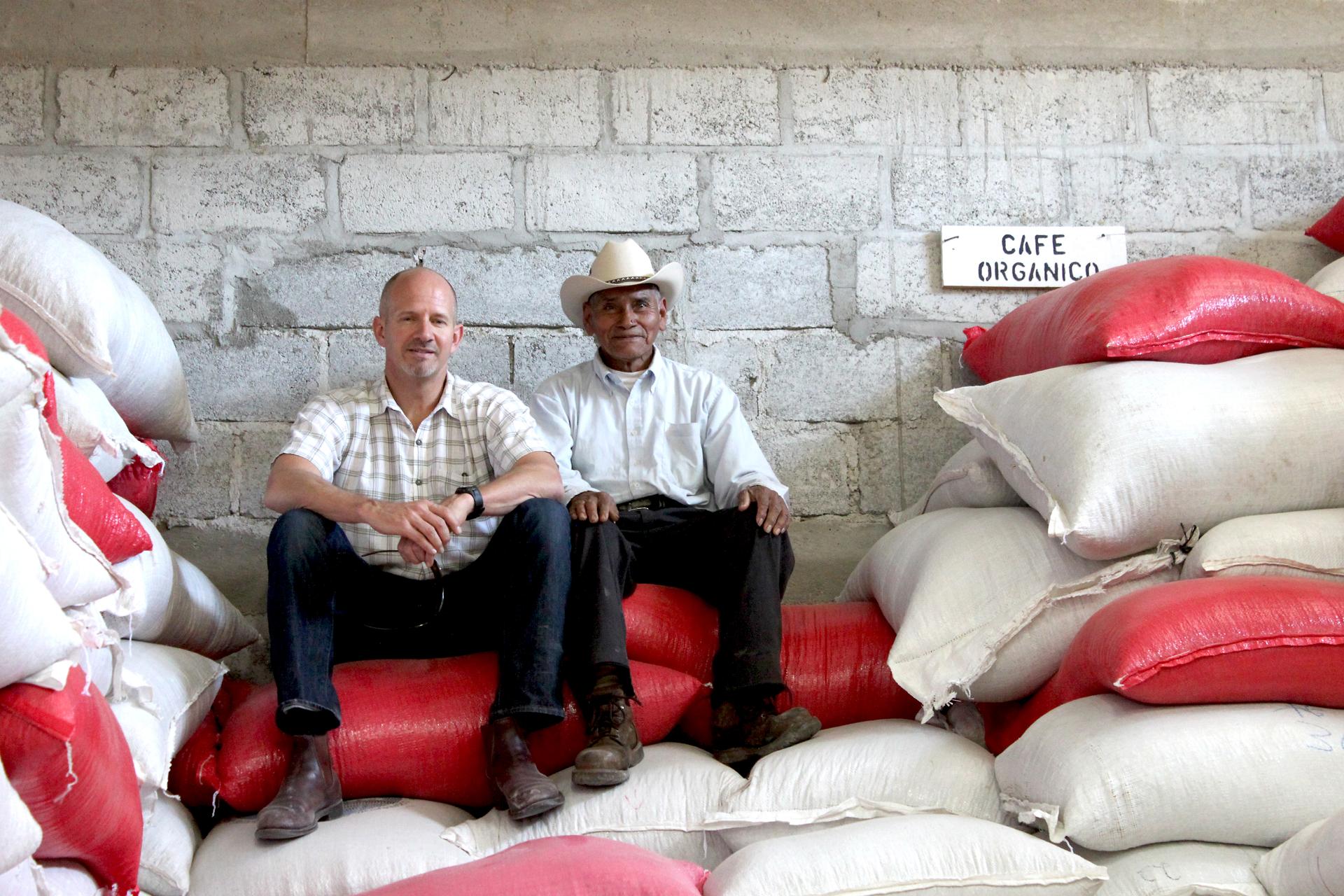Coffee shops, farmers and a banker team up to save Latin American coffee
Root Capital founder Willy Foote, left, visits with a coffee client, Jose Dominguez, in Marcala, Honduras, to survey the impact of la roya on coffee farms.
Coffee trees in Central and South America are in danger. They have always been vulnerable to a disease called leaf rust, or la roya in Spanish. But now a warmer, wetter climate is creating the worst outbreak in a generation.
Some 2 million people work in the coffee industry from Guatemala to Peru. Now, an estimated 400,000 of them are out of work. And, things could get worse.
Thousands of miles north in New England, some coffee shops and small bankers are working to make sure that doesn’t happen. They include people like Willy Foote with the non-profit investment firm Root Capital.
Foote traded in his power suit on Wall Street for jeans and a sweater vest in the 1990s to start Root Capital. Since then, his organization has loaned nearly a half billion dollars to small agricultural businesses throughout the developing world. He’s turned his attention to Central American coffee farmers battling leaf rust.
Foote isn’t your typical banker. When we met in his office in Cambridge, Mass., he wanted to play me a popular Latin American folk song about coffee on his guitar. Foote re-wrote the lyrics, and the song is now about the fungus impacting coffee, with lines in banker-speak.
“May the coffee rust die in the fields, thanks to a downpour of support and credits from buyers paying special premium prices,” said Foote, reading some of the lines.
As Foote was getting ready, I was thinking, this is going to be uncomfortable. I was wrong. It’s hard to believe that a song about a fungus and banking could actually be really engaging. [Listen to Foote sing by clicking the audio link above.]
Foote spends his days convincing wealthy donors to loan him money at low rates. Then, he loans that money back out at slightly higher rates, anywhere from 9 to 12 percent. Foote says his loans go to farmers operating in the so-called “missing middle.”
“They’re too large for microfinance, like the $300 loan to the street vendor, the shoe cobbler. And still too small, too risky, too remote for traditional banks,” he says.
Root Capital’s loans in Central America will be used to replace diseased coffee trees with a new, rust-resistant variety. The company recently made its first loan of $2 million to a farmer cooperative in Nicaragua.
It could make all the difference for the farmers, and if history holds, it should be a pretty safe bet for Root Capital, too. The company says it has a 98 percent repayment rate.
Small coffee houses like Coffee Exchange in Providence, RI, are also taking action to battle leaf rust. Charlie Fishbein has been roasting beans and serving up cups at his shop for three decades, offering his customers choices of beans from 30 nations.
“Our customers have become so sophisticated over the years about what coffee tastes better for them, they can tell the difference between coffee from Guatemala and coffee from Ethiopia,” Fishbein says.
Almost three-quarters of Fishbein’s beans come from Central America, so he worries his business could be devastated if his customers have fewer options. But he knows his problems are nothing compared to those faced by the Central American farmers he buys from.
“For coffee farmers who are dealing with this rust crisis … if they don’t have coffee to sell, they don’t eat,” he says.
Fishbein and 22 other small roasters in the US and Canada formed a group called Cooperative Coffees. They work closely with small-scale, organic farmers to help meet fair trade standards, which include practices like higher wages and better working conditions.
Now, they are fighting leaf rust. The North American roasters have recently tacked on an extra five cents per pound of coffee. In just a few months, these nickels have added up to $50,000 for Central American farmers to battle leaf rust.
“La roya happens almost every year, not to this extent, and not at this altitude,” Fishbein says. “It means that if we don’t catch it now and do something about it for the next crop, we could be in serious danger of losing a lot of coffee.”
If the disease outbreak does get worse, it’s going to take a lot more money coming from coffee sellers in the US and Canada, and not just small coffee houses. The big guys are well aware.
Starbucks recently bought a coffee farm in Costa Rica to study leaf rust. Green Mountain Coffee in Vermont is teaming up with Root Capital in Cambridge to raise $10 million to loan to farmers. They also plan to teach farmers new practices to battle the impact of a warming climate — because the growing techniques they’ve used for generations may no longer be enough.
